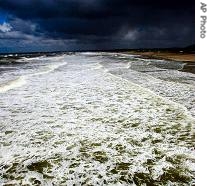Earth and Sky:By Lisa Bryant Paris
时间:2018-12-07 作者:英语课 分类:(科普英语)Earth and Sky
英语课

Paris Conference to Discuss Climate Change, Rising Oceans
Some of the world's leading experts on oceans and climate change are meeting in Paris this week to discuss why oceans are rising, and where to channel scarce research funds to study the phenomenon.
Most scientists agree on one thing that global warming is a key reason why the world's oceans and seas are rising. And most experts believe emissions 1 of heat-trapping greenhouse gasses are to blame. But just how fast these water bodies are rising, and how extensive the impact will be, is a matter of debate.
John Church, a leading Australian oceanographer who chairs a scientific committee at the World Climate Change Research Program, headquartered in Geneva, is among some 160 researchers who are debating these issues at a three-day conference in Paris.
"Firstly, sea level is rising now. It will continue to rise during this century. And unless we take action now it will continue to rise beyond that," he said. "So ultimately, we could be talking about large rises beyond 2100 - rises measured in meters. And also that we're impacted most through climate change by extreme events. Extreme events occur now."
Church says three major factors explain rising sea levels: As global warming heats up oceans, water expands. Melting of glaciers 2 in the Himalayas, Patagonia and Alaska also contribute to rising sea levels. And in the longer term, melting ice sheets in Antarctica and Greenland may also have an enormous impact.
A series of studies and reports paint grim scenarios 3 of the future: Shrinking beaches and vanishing tidal habitats, coastal 4 communities in the United States, South Africa and elsewhere threatened by flooding, and whole islands in the Pacific vanishing into the ocean.
There are already warning signs. Some eskimos in Alaskan islands are beginning to move to the mainland because of encroaching seas. And a few years ago, New Zealand agreed to take in as environmental refugees citizens of the Pacific nation of Tuvalu, who are leaving because of rising sea levels.
"Regardless of whether we reduce our emissions or not, we're still going to have to adapt to the impact of sea-level rise and climate change," continued Church. "And we can plan to retreat from parts of the coast. We can plan to protect parts of the coast - major cities for example. But we need to think ahead about what we're going to do in response to these issue - rather than allow these effects to occur."
But Church and other scientists say many governments are not moving fast enough to plan and adapt for the future. And in many cases, research funds to study sea level rise have been cut drastically.
1 emissions
排放物( emission的名词复数 ); 散发物(尤指气体)
- Most scientists accept that climate change is linked to carbon emissions. 大多数科学家都相信气候变化与排放的含碳气体有关。
- Dangerous emissions radiate from plutonium. 危险的辐射物从钚放散出来。
2 glaciers
冰河,冰川( glacier的名词复数 )
- Glaciers gouged out valleys from the hills. 冰川把丘陵地带冲出一条条山谷。
- It has ice and snow glaciers, rainforests and beautiful mountains. 既有冰川,又有雨林和秀丽的山峰。 来自英语晨读30分(高一)
3 scenarios
n.[意]情节;剧本;事态;脚本
- Further, graphite cores may be safer than non-graphite cores under some accident scenarios. 再者,根据一些事故解说,石墨堆芯可比非石墨堆芯更安全一些。 来自英汉非文学 - 环境法 - 环境法
- Again, scenarios should make it clear which modes are acceptable to users in various contexts. 同样,我们可以运用场景剧本来搞清楚在不同情境下哪些模式可被用户接受。 来自About Face 3交互设计精髓